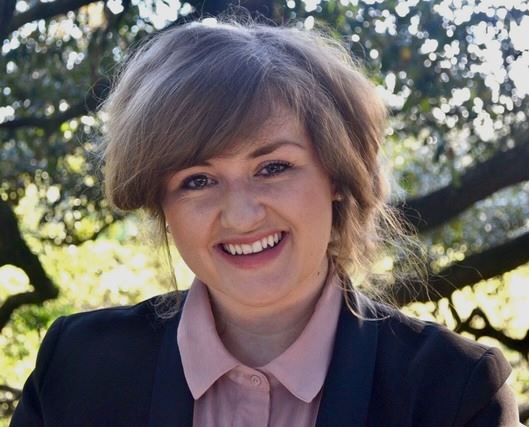
Elisabeth Fondren is an assistant professor of journalism at St. John’s University in New York. She received her Ph.D. in Media & Public Affairs from Louisiana State University (2018).
When and how did you become involved in AJHA?
I participated in my first AJHA conference in St. Petersburg, Florida, in 2016, when I was a doctoral student at Louisiana State University. My mentor, Dr. Erin Coyle, encouraged me to submit my work, and I was excited that I won both the Wally Eberhard Award for Outstanding Research in Media and War and the Robert Lance Memorial Award for the Outstanding Graduate Student Paper. I was welcomed very warmly by members and was impressed with how encouraging and open the organization was, and intrigued by the quality of research and discussions about journalism history.
Your paper recently won AJHA's awards for outstanding paper on a women's history topic and outstanding paper on transnational/international history. Talk a bit about that paper. What led you to that particular topic?
This paper explores the little-known story of Leonora Raines, an American female reporter (originally a fashion and music journalist) who covered the Great War from Paris. Raines had several brushes with foreign censors, including French and German military police, and she wrote about her interactions with propagandists, soldiers, and ordinary civilians. She gained access to dangerous frontlines, reported hospitals, ammunition factories, war-torn cities, the Western Front, German-occupied Belgium, and toured enemy Germany in 1915. Through her war reportage and eyewitness stories, which were primarily published in the New York Evening Sun, Raines brought the conflict home to distant American readers. At a time when most war reporters were men, Raines published her regular column under her own byline. Readers in the U.S. but also in Western Europe read her accounts, as foreign newspapers were widely distributed and, surprisingly, uncensored.
How does your research on Leonora Raines fit into your overall research agenda?
My research broadly explores the history of international journalism, government propaganda, military-media relations, and freedom of speech during wartime. I first came across Raines’ name while working in diplomatic archives in Berlin. The U.S. Ambassador to Imperial Germany, James W. Gerard, sent a letter to the German Foreign Office in spring 1915, announcing Raines’ arrival. German censors, in turn, then had secret discussions about how they could influence this female correspondent. I was really surprised that historians have neither mentioned Raines’ work nor fully studied her wartime journalism from Paris and Western Europe, and this led me to seek out and backtrack her story. In a related project, I am looking at international journalists’ discourse about government propaganda and publicity campaigns at the Paris Peace Conference (1919-1920). This period was marked by anxieties about the role of words and images used to ‘sell’ diplomacy and peace after belligerent countries had relied heavily on propaganda during the Great War.
How has your international experience influenced your approach to media history?
My worldview was shaped by having lived in Germany, Canada, the UK, and now the United States. After finishing high school in Germany, I backpacked coast-to-coast through Canada for one year. I completed my B.A. in humanities in Germany and pursued my master’s degree at City, University of London, where I studied international journalism. I met incredible people from all over the world, and their perspectives and experiences influenced my belief that our work as journalism historians is valuable. Some of my best friends are now correspondents in dangerous places or conflict zones. I think of them when I research reporters’ interactions with propagandists during past conflicts and how important it is to: 1) have journalists as eyewitnesses, and 2) for scholars to dig deep and reveal how governments continue to build proficiency in propaganda and censorship that restrict reporters’ access to all sides of the story.
How does your journalism history research influence your teaching?
I teach classes in Online News Writing, International Reporting, and Journalism History, which is really a great combination. I often feel that students have an interest in understanding the historical dimensions of news coverage and media systems, and I enjoy looking at news and journalism cultures through a comparative lens. Throughout the semester, I emphasize global perspectives and share work from reporters (past and present) to have discussions with students about the eyewitness role journalists play during conflicts and wars, the different reporting/writing styles, and the state of press freedom around the world, among other topics.
What are you working on now?
I just finished a long-form article that examines the German government’s “propaganda blackbox” during World War I (1914-1918), including their failure to modernize their messages and institutions, and how they tried to copy (unsuccessfully) the propaganda produced by enemy countries. All countries during and after the war claimed that they did not do propaganda—only other countries did it. Archival records, of course, paint a very different picture. This article will be published in Journalism & Communication Monographs later this fall. Currently, I am collecting primary sources and news materials for my first book project, which will be a cultural history of American reporters stationed in Berlin during the early twentieth century.
What are some of your hobbies or interests outside of academia?
I love traveling and exploring the East Coast and New England region with my husband, our seven-month-old daughter and our red heeler, Maxi. We try to do lots of weekend trips. I grew up in a mountainous region of Germany with much forest and small villages, which is why living in NYC (8.4 million people!) and being so close to the Atlantic Ocean is very exciting.

